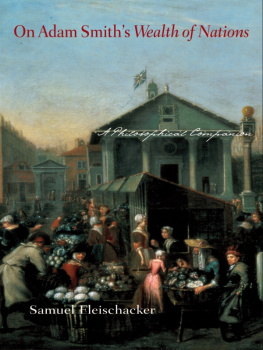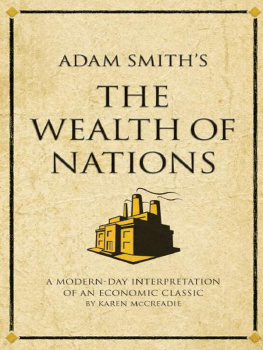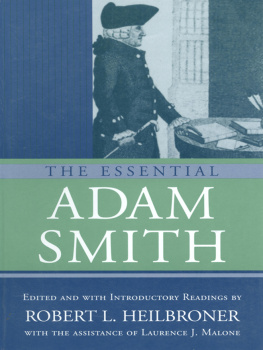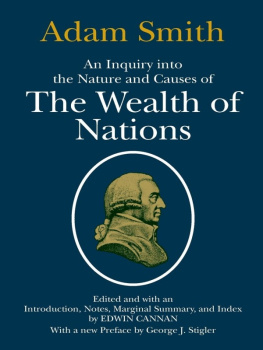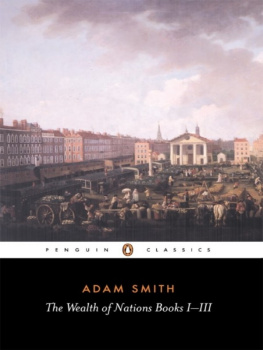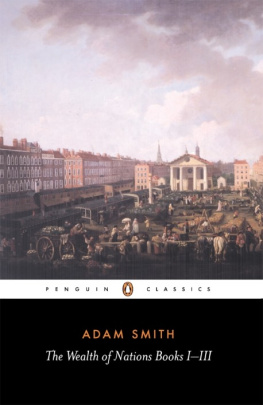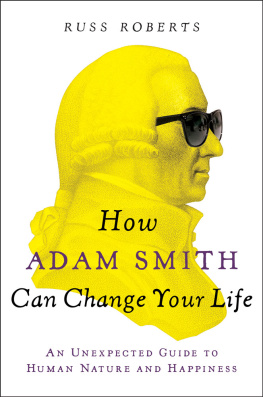Smith Adam - An Inquiry into the Nature and Causes of the Wealth of Nations
Here you can read online Smith Adam - An Inquiry into the Nature and Causes of the Wealth of Nations full text of the book (entire story) in english for free. Download pdf and epub, get meaning, cover and reviews about this ebook. year: 2003, publisher: Bantam Classics, genre: Science. Description of the work, (preface) as well as reviews are available. Best literature library LitArk.com created for fans of good reading and offers a wide selection of genres:
Romance novel
Science fiction
Adventure
Detective
Science
History
Home and family
Prose
Art
Politics
Computer
Non-fiction
Religion
Business
Children
Humor
Choose a favorite category and find really read worthwhile books. Enjoy immersion in the world of imagination, feel the emotions of the characters or learn something new for yourself, make an fascinating discovery.
- Book:An Inquiry into the Nature and Causes of the Wealth of Nations
- Author:
- Publisher:Bantam Classics
- Genre:
- Year:2003
- Rating:4 / 5
- Favourites:Add to favourites
- Your mark:
- 80
- 1
- 2
- 3
- 4
- 5
An Inquiry into the Nature and Causes of the Wealth of Nations: summary, description and annotation
We offer to read an annotation, description, summary or preface (depends on what the author of the book "An Inquiry into the Nature and Causes of the Wealth of Nations" wrote himself). If you haven't found the necessary information about the book — write in the comments, we will try to find it.
Smith Adam: author's other books
Who wrote An Inquiry into the Nature and Causes of the Wealth of Nations? Find out the surname, the name of the author of the book and a list of all author's works by series.
An Inquiry into the Nature and Causes of the Wealth of Nations — read online for free the complete book (whole text) full work
Below is the text of the book, divided by pages. System saving the place of the last page read, allows you to conveniently read the book "An Inquiry into the Nature and Causes of the Wealth of Nations" online for free, without having to search again every time where you left off. Put a bookmark, and you can go to the page where you finished reading at any time.
Font size:
Interval:
Bookmark:
The Project Gutenberg EBook of An Inquiry into the Nature and Causes of
the Wealth of Nations, by Adam Smith
This eBook is for the use of anyone anywhere at no cost and with
almost no restrictions whatsoever. You may copy it, give it away or
re-use it under the terms of the Project Gutenberg License included
with this eBook or online at www.gutenberg.org
Title: An Inquiry into the Nature and Causes of the Wealth of Nations
Author: Adam Smith
Release Date: February 28, 2009 [EBook #3300]
Language: English
*** START OF THIS PROJECT GUTENBERG EBOOK NATURE AND CAUSES OF THE WEALTH OF NATIONS ***
Produced by Colin Muir, and David Widger
BOOK I. OF THE CAUSES OF IMPROVEMENT IN THE PRODUCTIVE POWERS OF LABOUR, AND OF THE ORDER ACCORDING TO WHICH ITS PRODUCE IS NATURALLY DISTRIBUTED AMONG THE DIFFERENT RANKS OF THE PEOPLE. CHAPTER I. OF THE DIVISION OF LABOUR. CHAPTER II. OF THE PRINCIPLE WHICH GIVES OCCASION TO THE DIVISION OF LABOUR. CHAPTER III. THAT THE DIVISION OF LABOUR IS LIMITED BY THE EXTENT OF THE MARKET. CHAPTER IV. OF THE ORIGIN AND USE OF MONEY. CHAPTER V. OF THE REAL AND NOMINAL PRICE OF COMMODITIES, OR OF THEIR PRICE IN LABOUR, AND THEIR PRICE IN MONEY. CHAPTER VI. OF THE COMPONENT PART OF THE PRICE OF COMMODITIES. CHAPTER VII. OF THE NATURAL AND MARKET PRICE OF COMMODITIES. CHAPTER VIII. OF THE WAGES OF LABOUR. CHAPTER IX. OF THE PROFITS OF STOCK. CHAPTER X. OF WAGES AND PROFIT IN THE DIFFERENT EMPLOYMENTS OF LABOUR AND STOCK. CHAPTER XI. OF THE RENT OF LAND. BOOK II. OF THE NATURE, ACCUMULATION, AND EMPLOYMENT OF STOCK. CHAPTER I. OF THE DIVISION OF STOCK. CHAPTER II. OF MONEY, CONSIDERED AS A PARTICULAR BRANCH OF THE GENERAL STOCK OF THE SOCIETY, OR OF THE EXPENSE OF MAINTAINING THE NATIONAL CAPITAL. CHAPTER III. OF THE ACCUMULATION OF CAPITAL, OR OF PRODUCTIVE AND UNPRODUCTIVE LABOUR. CHAPTER IV. OF STOCK LENT AT INTEREST. CHAPTER V. OF THE DIFFERENT EMPLOYMENTS OF CAPITALS. BOOK III. OF THE DIFFERENT PROGRESS OF OPULENCE IN DIFFERENT NATIONS CHAPTER I. OF THE NATURAL PROGRESS OF OPULENCE. CHAPTER II. OF THE DISCOURAGEMENT OF AGRICULTURE IN THE ANCIENT STATE OF EUROPE, AFTER THE FALL OF THE ROMAN EMPIRE. CHAPTER III. OF THE RISE AND PROGRESS OF CITIES AND TOWNS, AFTER THE FALL OF THE ROMAN EMPIRE. CHAPTER IV. HOW THE COMMERCE OF TOWNS CONTRIBUTED TO THE IMPROVEMENT OF THE COUNTRY. BOOK IV. OF SYSTEMS OF POLITICAL ECONOMY. CHAPTER I. OF THE PRINCIPLE OF THE COMMERCIAL OR MERCANTILE SYSTEM. CHAPTER II. OF RESTRAINTS UPON IMPORTATION FROM FOREIGN COUNTRIES OF SUCH GOODS AS CAN BE PRODUCED AT HOME. CHAPTER III. OF THE EXTRAORDINARY RESTRAINTS UPON THE IMPORTATION OF GOODS OF ALMOST ALL KINDS, FROM THOSE COUNTRIES WITH WHICH THE BALANCE IS SUPPOSED TO BE DISADVANTAGEOUS. CHAPTER IV. OF DRAWBACKS. CHAPTER V. OF BOUNTIES. CHAPTER VI. OF TREATIES OF COMMERCE. CHAPTER VII. OF COLONIES. CHAPTER VIII. CONCLUSION OF THE MERCANTILE SYSTEM. CHAPTER IX. OF THE AGRICULTURAL SYSTEMS, OR OF THOSE SYSTEMS OF POLITICAL ECONOMY WHICH REPRESENT THE PRODUCE OF LAND, AS EITHER THE SOLE OR THE PRINCIPAL SOURCE OF THE REVENUE AND WEALTH OF EVERY COUNTRY. BOOK V. CHAPTER I. OF THE EXPENSES OF THE SOVEREIGN OR COMMONWEALTH. CHAPTER II. OF THE SOURCES OF THE GENERAL OR PUBLIC REVENUE OF THE SOCIETY. CHAPTER III. OF PUBLIC DEBTS. |
The annual labour of every nation is the fund which originally supplies it with all the necessaries and conveniencies of life which it annually consumes, and which consist always either in the immediate produce of that labour, or in what is purchased with that produce from other nations.
According, therefore, as this produce, or what is purchased with it, bears a greater or smaller proportion to the number of those who are to consume it, the nation will be better or worse supplied with all the necessaries and conveniencies for which it has occasion.
But this proportion must in every nation be regulated by two different circumstances: first, by the skill, dexterity, and judgment with which its labour is generally applied; and, secondly, by the proportion between the number of those who are employed in useful labour, and that of those who are not so employed. Whatever be the soil, climate, or extent of territory of any particular nation, the abundance or scantiness of its annual supply must, in that particular situation, depend upon those two circumstances.
The abundance or scantiness of this supply, too, seems to depend more upon the former of those two circumstances than upon the latter. Among the savage nations of hunters and fishers, every individual who is able to work is more or less employed in useful labour, and endeavours to provide, as well as he can, the necessaries and conveniencies of life, for himself, and such of his family or tribe as are either too old, or too young, or too infirm, to go a-hunting and fishing. Such nations, however, are so miserably poor, that, from mere want, they are frequently reduced, or at least think themselves reduced, to the necessity sometimes of directly destroying, and sometimes of abandoning their infants, their old people, and those afflicted with lingering diseases, to perish with hunger, or to be devoured by wild beasts. Among civilized and thriving nations, on the contrary, though a great number of people do not labour at all, many of whom consume the produce of ten times, frequently of a hundred times, more labour than the greater part of those who work; yet the produce of the whole labour of the society is so great, that all are often abundantly supplied; and a workman, even of the lowest and poorest order, if he is frugal and industrious, may enjoy a greater share of the necessaries and conveniencies of life than it is possible for any savage to acquire.
The causes of this improvement in the productive powers of labour, and the order according to which its produce is naturally distributed among the different ranks and conditions of men in the society, make the subject of the first book of this Inquiry.
Whatever be the actual state of the skill, dexterity, and judgment, with which labour is applied in any nation, the abundance or scantiness of its annual supply must depend, during the continuance of that state, upon the proportion between the number of those who are annually employed in useful labour, and that of those who are not so employed. The number of useful and productive labourers, it will hereafter appear, is everywhere in proportion to the quantity of capital stock which is employed in setting them to work, and to the particular way in which it is so employed. The second book, therefore, treats of the nature of capital stock, of the manner in which it is gradually accumulated, and of the different quantities of labour which it puts into motion, according to the different ways in which it is employed.
Nations tolerably well advanced as to skill, dexterity, and judgment, in the application of labour, have followed very different plans in the general conduct or direction of it; and those plans have not all been equally favourable to the greatness of its produce. The policy of some nations has given extraordinary encouragement to the industry of the country; that of others to the industry of towns. Scarce any nation has dealt equally and impartially with every sort of industry. Since the down-fall of the Roman empire, the policy of Europe has been more favourable to arts, manufactures, and commerce, the industry of towns, than to agriculture, the Industry of the country. The circumstances which seem to have introduced and established this policy are explained in the third book.
Font size:
Interval:
Bookmark:
Similar books «An Inquiry into the Nature and Causes of the Wealth of Nations»
Look at similar books to An Inquiry into the Nature and Causes of the Wealth of Nations. We have selected literature similar in name and meaning in the hope of providing readers with more options to find new, interesting, not yet read works.
Discussion, reviews of the book An Inquiry into the Nature and Causes of the Wealth of Nations and just readers' own opinions. Leave your comments, write what you think about the work, its meaning or the main characters. Specify what exactly you liked and what you didn't like, and why you think so.


